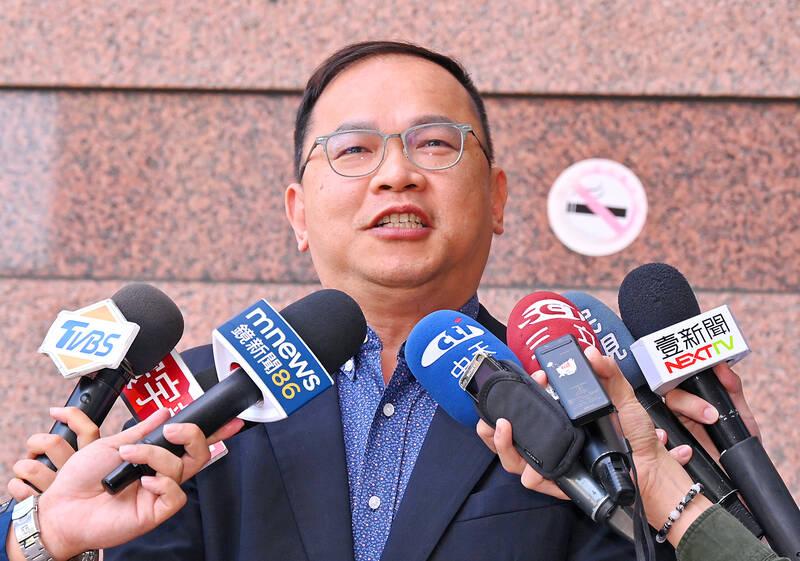China’s Taiwan Affairs Office (TAO) yesterday announced sanctions against five Taiwanese politicians, pundits and public figures critical of Beijing, accusing them of spreading disinformation about China.
The five are: Liu Bao-jie (劉寶傑), Lee Zheng-hao (李正皓), Wang Yi-chuan (王義川), Yu Pei-chen (于北辰), Huang Shih-tsung (黃世聰), TAO spokesman Chen Binhua (陳斌華) told a routine news briefing, adding that the sanctions included their families.
They were responsible for making up and spreading false information about China that “deceived some Taiwanese, sowed division ... and harmed brotherly goodwill across the Strait,” Chen said.

Photo: Liu Hsin-de, Taipei Times
Speech is not free from the regulations of Chinese law, which punishes manufacturing incorrect information, spreading rumors or causing harm to the nation’s interest and honor, he said.
Asked to specify the form of the sanctions, Chen said they would be similar to the punitive measures previously imposed by the Chinese government on supporters of Taiwanese independence.
Beijing’s past sanctions on Taiwanese figures have included banning them and family members from entering China and its territories, doing business or engaging in collaborations in the country, and punitive measures targeting people and entities affiliated with the sanctioned individuals.
Wang, who is director of the Democratic Progressive Party’s (DPP) Policy Research and Coordinating Committee, wrote on Threads that he “is not the first and will not be the last” to draw Beijing’s ire for voicing an opinion.
“The TAO’s use of divisive labels is exactly what harms ties,” he said, adding that the office “claims to welcome dialogue, but simultaneously interferes with the exercise of free speech by Taiwanese.”
Yu, a Taoyuan city councilor and retired army general, told Central News Agency that the Chinese officials were 41 years late in imposing sanctions on him, as he enlisted in the armed forces in 1983.
He added that being recognized by the enemy for opposing communism is the greatest honor he has ever had and better than any medal he received.
Beijing has accused 15 Taiwanese politicians and public figures of separatism since the TAO in 2020 disclosed the existence of a “stubbornly pro-Taiwan independence” list.
The TAO a year later announced sanctions on DPP politicians, including Minister of Foreign Affairs Joseph Wu (吳釗燮), then-premier Su Tseng-chang (蘇貞昌) and then-legislative speaker You Si-kun (游錫?).
In 2022, then-representative to the US Hsiao Bi-khim (蕭美琴), then-National Security Council secretary-general Wellington Koo (顧立雄), legislators Tsai Chi-chang (蔡其昌), Ker Chien-ming (柯建銘), Chen Jiau-hua (陳椒華) and Wang Ting-yu (王定宇), and then-DPP deputy secretary-general Lin Fei-fan (林飛帆) were added to the list.
Beijing imposed augmented sanctions on Hsiao during last year’s presidential campaign, when she was incoming president William Lai’s (賴清德) running mate.

CHAOS: Iranians took to the streets playing celebratory music after reports of Khamenei’s death on Saturday, while mourners also gathered in Tehran yesterday Iranian Supreme Leader Ayatollah Ali Khamenei was killed in a major attack on Iran launched by Israel and the US, throwing the future of the Islamic republic into doubt and raising the risk of regional instability. Iranian state television and the state-run IRNA news agency announced the 86-year-old’s death early yesterday. US President Donald Trump said it gave Iranians their “greatest chance” to “take back” their country. The announcements came after a joint US and Israeli aerial bombardment that targeted Iranian military and governmental sites. Trump said the “heavy and pinpoint bombing” would continue through the week or as long

TRUST: The KMT said it respected the US’ timing and considerations, and hoped it would continue to honor its commitments to helping Taiwan bolster its defenses and deterrence US President Donald Trump is delaying a multibillion-dollar arms sale to Taiwan to ensure his visit to Beijing is successful, a New York Times report said. The weapons sales package has stalled in the US Department of State, the report said, citing US officials it did not identify. The White House has told agencies not to push forward ahead of Trump’s meeting with Chinese President Xi Jinping (習近平), it said. The two last month held a phone call to discuss trade and geopolitical flashpoints ahead of the summit. Xi raised the Taiwan issue and urged the US to handle arms sales to

BIG SPENDERS: Foreign investors bought the most Taiwan equities since 2005, signaling confidence that an AI boom would continue to benefit chipmakers Taiwan Semiconductor Manufacturing Co’s (TSMC, 台積電) market capitalization swelled to US$2 trillion for the first time following a 4.25 percent rally in its American depositary receipts (ADR) overnight, putting the world’s biggest contract chipmaker sixth on the list of the world’s biggest companies by market capitalization, just behind Amazon.com Inc. The site CompaniesMarketcap.com ranked TSMC ahead of Saudi Aramco and Meta Platforms Inc. The Taiwanese company’s ADRs on Tuesday surged to US$385.75 on the New York Stock Exchange, as strong demand for artificial intelligence (AI) applications led to chip supply constraints and boost revenue growth to record-breaking levels. Each TSMC ADR represents

Pro-democracy media tycoon Jimmy Lai’s (黎智英) fraud conviction and prison sentence were yesterday overturned by a Hong Kong court, in a surprise legal decision that comes soon after Lai was jailed for 20 years on a separate national security charge. Judges Jeremy Poon (潘兆初), Anthea Pang (彭寶琴) and Derek Pang (彭偉昌) said in the judgement that they allowed the appeal from Lai, and another defendant in the case, to proceed, as a lower court judge had “erred.” “The Court of Appeal gave them leave to appeal against their conviction, allowed their appeals, quashed the convictions and set aside the sentences,” the judges